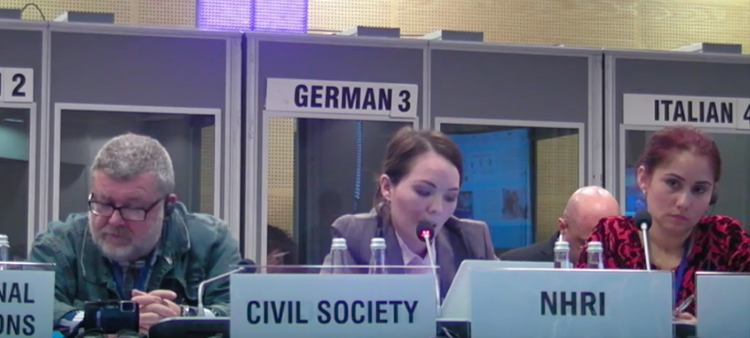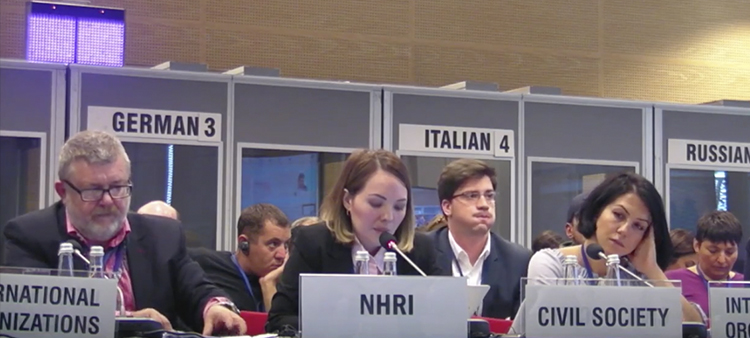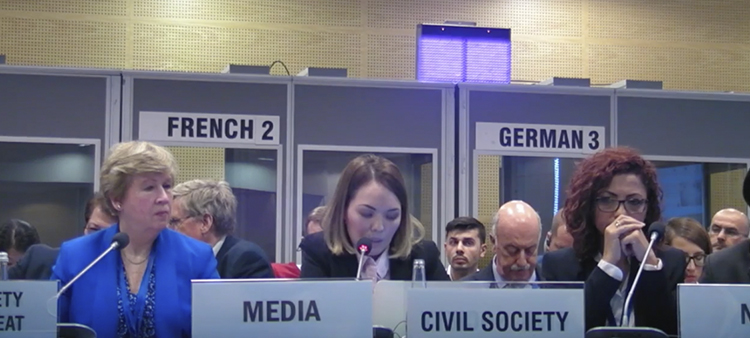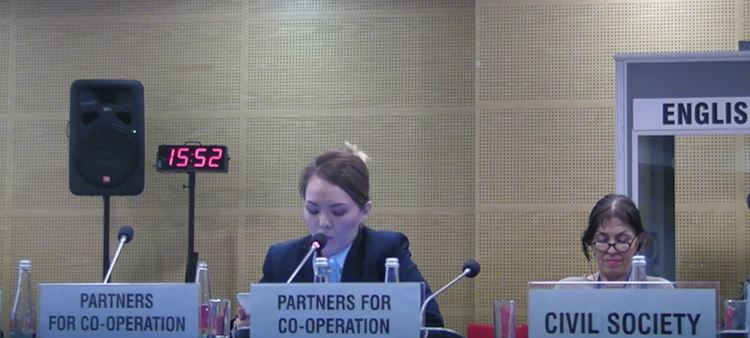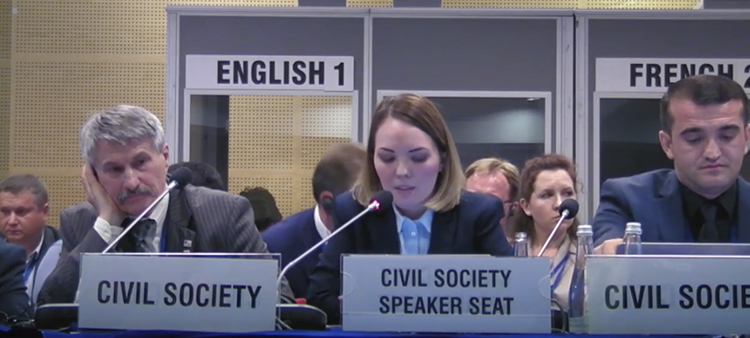Lawyers day without lawyers.
Published on 2018-05-26, Amsterdam

May 26 is celebrated in Tajikistan as the day of the Bar Association. In this regard, we want to congratulate all representatives of this profession on a professional holiday. We wish you success and victories in the provision of qualified legal assistance to individuals and legal entities to protect their rights, freedoms and legitimate interests. Unfortunately, at present, the implementation of advocacy in Tajikistan has become very difficult, and sometimes impossible business. Often lawyers in Tajikistan are not only given the opportunity to protect the rights of their clients, but also violated of their own rights.
Advocacy is one of the main institutions of civil society and serves to protect the rights and freedoms of citizens and of society as a whole, as well as to strengthen the rule of law in the state. Article 9 of the Constitution of Tajikistan provides that everyone has the right to protection and counsel. By this, the state shows that it recognizes the necessary role of the Bar in strengthening the rule of law and justice. However, in practice, everything is totally different.
Till 2015, the advocacy in Tajikistan was not centralized, there were various lawyers and international law firms providing legal services, but none of these organizations had a single rule for admission of a candidate to practice law, there was no single sample of the warrant, in various colleges there were different requirements for the candidate, there was no single statistical record on the Bar, there was no single list of practicing lawyers.
The new Law of the Republic of Tajikistan "On Advocacy", adopted in March 2015, was designed to radically improve the system of advocacy and resolve existing problems. According to this Law, all advocates in the country are united in a single Union of Advocates of Tajikistan. The Law establishes unified criteria for entering the profession for candidates wishing to engage in advocacy, as well as orderly exit from the profession. It also became possible to create a single law practice and normative legal documents, common samples of orders and agreements with customers. An advocate must necessarily be a member of the Union of Lawyers. In addition, the status of a lawyer can only be obtained from a Tajik citizen who speaks the state language and has a higher legal education.
In the field of advocacy, positive changes were expected and everything would have happened, had it not been for the amendments to this Law that were made following in November 2015. Thus, amendments to the Law established that the Qualification Commission, responsible for conducting professional examinations and issuing licenses to lawyers, is not with the Union of Lawyers of Tajikistan, but with the Ministry of Justice, which verifies the authenticity of the documents submitted by the applicant for obtaining the status of a lawyer and checking for knowledge of their profession. Although the commission includes representatives of the Bar, but the head of this Qualification Commission is the Deputy Minister of Justice. In a view of the fact that in September 2015 during the first congress of Tajik Lawyers Union delegates, it was the first deputy minister of justice of Tajikistan, Mr. Holikzoda Abdumanon, who attempted to exert an unlawful influence on delegates to select the head of the Union of Advocates required by the ministry and authorities, the objectivity and impartiality of this The Qualification Commission remains in doubt. The lawyers themselves say about this in the country.
In addition, many provisions stipulated by the Law, in fact, remained only in theory. Thus, in accordance with Article 6 of this Law, in order to promote advocacy and ensure access to legal assistance for the population, state bodies must ensure guarantees for the independence of the Bar, finance the activities of lawyers providing free legal aid to individuals, and also, if necessary, allocate office premises, equipment and communications facilities to lawyer formations. Three years have passed since the adoption of the Law, but little has been done by the state in this direction. Advocacy in Tajikistan remains dependent and controlled by state structures.
Another problem with the new Law was the restriction of the list of persons entitled to practice as a lawyer. So, according to Article 12 of the Law "On Advocacy" a citizen does not have the right to claim the status of an attorney and carry out advocacy if he:
• convicted for committing a crime;
• dismissed from state bodies, judicial bodies, judicial authorities, prosecutors, advocates, other law enforcement agencies, military service for violating a professional oath and committing acts of a corrupt nature;
• released from criminal liability on the basis of adoption of amnesty acts; is released from criminal prosecution in connection with a repentance in fulfillment of the deed; is released from criminal liability in connection with reconciliation with the victim; is released from criminal liability due to a change in the situation, and also if he is released from criminal liability in connection with the expiration of the statute of limitations.
These provisions of the law contradict not only the Constitution and the norms of the Labor Code of Tajikistan, but also the provisions of the Criminal Code, according to which the repayment or removal of criminal record annuls the legal consequences of criminal liability.
Worth to mention that the International Commission of Jurists, in its recommendations on the independence of the Bar in Tajikistan, published in February 2017, expressed concern that the provision of part 2 of article 12 of the Law "On Advocacy", according to which a person, "Convicted for committing an intentional crime," is not allowed to pass the qualification exam, can lead to confusion and create legal uncertainty, as contrary to the provisions of the Criminal Code, which determines which are an obstacle for occupying other positions and obtaining a different professional status in Tajikistan.
These reforms in the system of advocacy were the result of a sharp reduction in the number of lawyers in the country. According to the Ministry of Justice of Tajikistan, as of April 2018, there are 653 lawyers in Tajikistan. That is, now 1 lawyer accounts for more than 13 thousand residents.
For more than past three years, since the adoption of the Law "On Advocacy" in Tajikistan, there is still no Internet resource of the Union of Advocates. The population does not have the opportunity to get acquainted with the activities of the Bar, there is no single list of acting lawyers with their contact details. Although the official website of the Ministry of Justice has a page "Registry of lawyers", where there should be information about lawyers in the country, however it is currently not active.
All these restrictions and omissions once again serve as proof that the Bar in Tajikistan is considered of little importance in the administration of justice, and the state is not interested in assisting in the formation and strengthening of the institution of the Bar.
Although the country's legislation sets out the principle of equality and competitiveness of the parties in the course of judicial proceedings, but in reality lawyers are still dependent on the will and interests of the bodies of inquiry, investigation or trial.
The prosecution authorities, in particular the prosecutor's office, have an advantage over a number of powers over the side of the defense. This matter concerns, first of all, issues related to the access of lawyers to the case materials, timely access to clients suspected of committing a crime.
According to Article 9, Clause 3 of the Law "On Advocacy", a lawyer has the right to meet with his client in private (including from the moment of actual detention, detention in a temporary detention facility, an investigatory isolator or a correctional facility) when providing a warrant and an attorney's certificate; confidential without limiting the number of visits and their duration. In practice, this does not happen. The lawyer, in the presence of an order, is forced to ask for written permission from the investigator and the court to meet with his client. Sometimes a lot of precious time is spent on obtaining this permission, during which the investigator conducts investigative actions, has an impact on the defendant, violates his right to protection and qualified legal assistance.
On the other hand, the most significant factor influencing the work of the Bar in the country are the pressures, harassment and arrests of such well-known lawyers as Buzurgmehr Yorov, Nuriddin Mahkamov, Shukhrat Kudratov, Fakhriddin Zokirov, Faiziniso Vohidova, Iskhok Tabarov and others who honestly performed their professional debt.
According to the UN Basic Principles on the Role of Lawyers, "lawyers are not identified with their clients or the interests of their clients as a result of their functions" and should be able to "fulfill all their professional duties in an environment free of threats, obstacles, intimidation or unjustified interference". In addition, lawyers should not be subject to "prosecution and judicial, administrative, economic or other sanctions for any acts committed in accordance with recognized professional duties, norms and ethics, as well as threats of such harassment and sanctions."
The arrests of Buzurgmehr Yorov and Nuriddin Makhkamov took place against the backdrop of increased suppression of dissent on the part of the authorities, preceded by arrests, imprisonment and intimidation of several other lawyers who were battling for political affairs. So, on January 13, 2015, a court in Dushanbe sentenced a well-known lawyer and human rights activist Shukhrat Kudratov to nine years in prison on politically motivated charges of fraud and bribery. Later, as a matter of appeal, the term was reduced to five years and four months. Shukhrat Kudratov was eligible for early release, according to two articles of the presidential amnesty law, but is still kept in prison.
A few months before Shukhrat Kudratov was sentenced to jail, he defended Zaid Saidov, an oppositionist sentenced in December 2013 to 26 years in prison. The prosecution of Zaid Saidov, apparently, was organized in retaliation for his intention to run for president in November 2013. In August 2015, the prosecutor's office brought new charges against Zaid Saidov. As a result, his term was added for another three years.
In March 2014, the Tajikistan Anti-Corruption Agency arrested another prominent lawyer, Fakhriddin Zokirov, on fraud charges. Fakhriddin Zokirov stayed in custody until November 3, then he was released under an amnesty. The International Commission of Jurists and 18 Tajik non-governmental organizations called the arrests of Shukhrat Kudratov and Fakhriddin Zokirov politically motivated.
In July 2015, the lawyer from Khujand, Faizinisso Vohidova, known for her human rights activities and work in criminal trials, told Human Rights Watch that she received SMS messages threatening to kill or seriously injure her and her relatives if she did not stop defending the accused in political processes.
Iskhok Tabarov, one of the three lawyers of Zaid Saidov, died of a heart attack in June 2016. The authorities repeatedly threatened Iskhok Tabarov, trying to force him to stop working in a team of defense lawyers Zaid Saidov. Earlier, the eldest son of Iskhok Tabarov, Firuz Tabarov, was arrested and charged with mercenarism and public calls to change the constitutional system and sentenced to 13 years. A month after the conviction of Firuz Tabarov, his brother Dalet Tabarov was arrested on charges of not reporting a crime and sentenced to 3 years imprisonment. Iskhok Tabarov claimed that the arrest of his sons was a response of the Tajik authorities for his professional activities, in particular the defense of Zaid Saidov.
Advocacy has always been and remains a non-state self-developing system that lives according to its own internal laws. Ignore this means ignore the laws that apply here, neither to the state, nor to society, nor, especially, to the Bar. The tasks of all parties are to realize the seriousness of the institution of the legal profession, to learn its laws, to make maximum use of the opportunities available to the Bar and to ensure its further development.
In view of the foregoing, the Human Rights Vision Foundation calls on the Tajik authorities to fully respect the rights of lawyers and ensure that the provisions of international law, in particular the UN Basic Principles on the Role of Lawyers, are implemented in law, policy and practice.
Review the Law "On the Advocacy" and abolish those provisions that restrict the independence of lawyers. Immediately release the human rights lawyers of Buzurgmehr Yorov, Nuriddin Mahkamov and Shukhrat Kudratov. Respect freedom of expression and stop harassment of lawyers for their professional activities, as well as political and civil activists for dissent.
We also call on Tajikistan's partners to raise questions about the cases of political prisoners and violations of human rights in Tajikistan, and clearly state that this attitude of the Tajik authorities is contrary to their international obligations.


